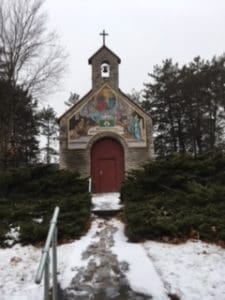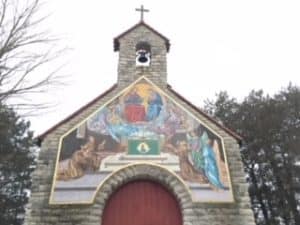Consider our Fourth Sunday of Ordinary Time collaborative Franciscan Gospel post this week. This weekly Sunday Gospel reflection and questions are written by Fr. Paul Gallagher, OFM. They are edited by Franciscan Sister of Christian Charity Sister Anne Marie Lom and Joe Thiel. The excerpts from the Sunday readings are prepared by Joe Thiel. If you would like to read or download the complete pdf with excerpts for your prayer, please click here: Franciscan Gospel Reflection January 28 2018 Excerpts from the Lectionary for Mass for Use in the Dioceses of the United States of America, second typical edition © 2001, 1998, 1997, 1986, 1970 Confraternity of Christian Doctrine, Inc., Washington, DC. Used with permission. All rights reserved. No portion of this text may be reproduced by any means without permission in writing from the copyright owner. Please include this information when printing.
Photos: Franciscan Friars of the Assumption BVM Province’ Portiuncula at St. Francis Friary, Burlington, WI

Mark 1:21-28
Then they came to Capernaum, and on the Sabbath he [Jesus] entered the synagogue and taught. The people were astonished at his teaching, for he taught them as one having authority and not as the scribes.
In their synagogue was a man with an unclean spirit; he cried out, “What have you to do with us, Jesus of Nazareth? Have you come to destroy us? I know who you are–the Holy One of God!” Jesus rebuked him and said, “Quiet! Come out of him!” The unclean spirit convulsed him and with a loud cry came out of him.
All were amazed and asked one another, “What is this? A new teaching with authority. He commands even the unclean spirits and they obey him.” His fame spread everywhere throughout the whole region of Galilee.
Background
The gospel text for this Sunday follows Mark’s call of the first disciples that was the gospel for last week. This is Mark’s description of Jesus as he begins public ministry. Jesus is described as a teacher at the beginning and the end of the text. But he is not like the other teachers of the day, the scribes, who would have taught by citing the teachings of other great teachers who had gone before them. One might think of a teacher who quotes many highly respected sources in the course of a lecture.
Jesus’ teaching is described in the middle verses of this text. But Jesus’ teaching is not an instruction in the usual sense. Rather it is Jesus’ encounter with the unclean spirit. People of the day believed in the presence of many spirits. Some were kind, others were menacing, but all were believed to be more powerful than humans. The people believed that only God was more powerful. A person with an unclean spirit would have made all those who had contact with him also ritually impure. If such a person were found in a synagogue, he would have been removed. The spirit in this gospel tries to take the upper hand in the situation by claiming to know Jesus’ name, calling him Jesus of Nazareth and the Holy One of God. But Jesus is the more powerful, despite that fact that the spirit can call out his name. Jesus tells them, all of them, to be quiet and come out of the man. Because they obey Jesus, he has taught those who witness this event that he is more powerful than the spirit that possessed the man. This will raise another familiar question: What is the source of Jesus’ power?
Reflection Questions
1. Do you believe in the existence of spirits, either good or evil?
2. Do you generally operate believing that you have power over your own life, over how your life is unfolding, and over what you choose to do or not to do? Can you think of examples from your daily life that support your assumption?
3. Are you also aware of places in your life that would suggest that you may not be as in charge of your own life as you would like to think?
4. When you think of Jesus as a teacher, what are some of the great moments of Jesus the teacher?
5. When you think of Jesus revealing his authority, what are the moments you recall? What does it mean for you that Jesus taught with authority?
6. Who are the people who have taught you with authority? What about them gave them their authority?
7. Where do you find examples of people who confront evil and at the same time restore the honor of the individual?
8. Can you talk to God about your desire to have people who can teach you with authority, or your desire to be that kind of teacher for others, or some other thought that arose in you as you reflected on this gospel?



